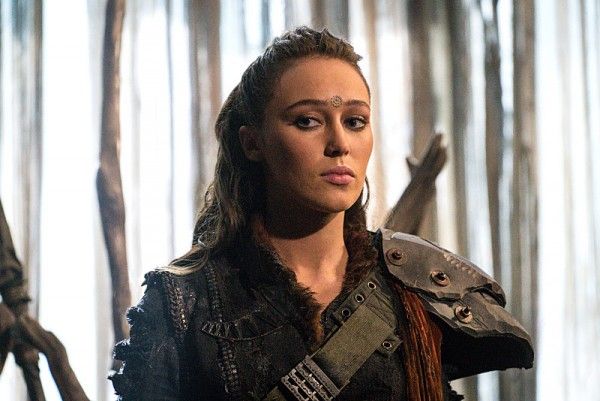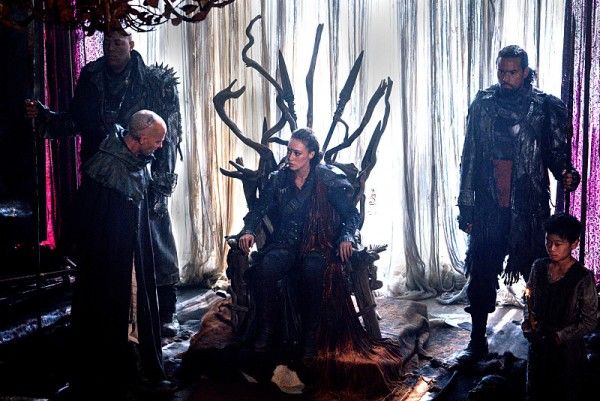Be aware there are major The 100 spoilers below.
If you're a fan of The 100, you're probably still at least a little heartbroken over Lexa's death in "Thirteen". The fearless commander of the grounders played by Alicia Debnam-Carey was felled not in the heat of battle, but by a stray bullet at the hands of her most loyal servant moments after finally consummating her relationship with Clarke. It sucked. It was a bad way for a warrior like Lexa to go, and worse, a glaring instance of a common television trope called Bury Your Gays, which basically means queer folk just don't get happy endings. Instead, they die. A lot.
Ever since "Thirteen" aired, showrunner Jason Rothenberg has come under fire from the LGBTQ fan contingent, who feel not only disappointed by the manner of Lexa's death, but manipulated by aggressive marketing tactics that rallied and hyped the queer fanbase only to go stone cold silent when faced with outcry from that same fanbase. Essentially, they felt mislead, exploited and ultimately betrayed. After weeks of a notable silence on social media, Rothenberg (who is usually tremendously engaged with his viewership) has finally spoken out about the controversial storyline and the subsequent outcry in a piece on Medium called "The Life and Death of Lexa".
Rothenberg penned a thoughtful piece, and seemingly genuine apology to the fans, addressing the importance of their relationship both in the scope of the television landscape and on a more personal level,
For many fans of The 100, the relationship between Clarke and Lexa was a positive step of inclusion. I take enormous pride in that, as I do in the fact that our show is heading into its 4th season with a bisexual lead and a very diverse cast. The honesty, integrity and vulnerability Eliza Taylor and Alycia Debnam-Carey brought to their characters served as an inspiration for many of our fans. Their relationship held greater importance than even I realized. And that very important representation was taken away by one stray bullet.
He also spoke to the "Everyone Can Die" nature of the series and delineated the reasons that Lexa's death played out the way it did,
In the show-world, no one is safe, and anyone, even a beloved character, can die, at any time. My favorite shows in this genre embrace a similar sense of heightened urgency. There are several reasons why this particular episode played out the way it did: practical (an actress was leaving the show), creative (it’s a story about reincarnation) and thematic (it’s a show about survival). Despite my reasons, I still write and produce television for the real world where negative and hurtful tropes exist. And I am very sorry for not recognizing this as fully as I should have. Knowing everything I know now, Lexa’s death would have played out differently.
Rothenberg also adressed that there is a responsibility to the way that LGBTQ characters are handled because of the day-to-day experiences of their real-life counterparts.
But I’ve been powerfully reminded that the audience takes that ride in the real world — where LGBTQ teens face repeated discrimination, often suffer from depression and commit suicide at a rate far higher than their straight peers. Where people still face discrimination because of the color of their skin. Where, in too many places, women are not given the same opportunities as men, especially LGBTQ women who face even tougher odds. And where television characters are still not fully representative of the diverse lives of our audience. Not even close.
Unfortunately, that bolded section in the quotes above [sic], is directly contrary to something Rothenberg said only days ago. In an interview with TV Insider, the showrunner insisted that even if he knew what he does now, he wouldn't change the story. It's a weird bit of flipping the script, and it's unfortunate because what he said in the interview was actually on point. It's not so much the story itself that inflamed the fanbase (though, stray bullet lesbian deaths should go the way of the dinosaur), but the queerbaiting marketing tactics and hype machine that made them feel used.
Ultimately, I don't believe Rothenberg was trying to exploit anybody. That doesn't mean he didn't, but I do think his intentions as a creator are in the right place. He wants to showcase diversity. He wants to give rich storylines to characters of all ages, races, genders and ability. He, and his room of writers, made a disappointingly trite choice, and unfortunately, backed that choice loud and proud in their marketing strategy. But even if this is an attempt at damage control ( and why would any sane person not attempt damage control at this point?), it can also be genuine. Just because he waited three weeks doesn't make it disingenuous. In fact, when confronted with such a sea change in the discourse, it's only natural that it would take time to absorb and react. It shows thoughtfulness. Not rash reactionary defense. I'll be attending The 100 WonderCon panel and I'm very interested to see how the discourse continues when the fans and creators are face to face.
We do know that The 100 will return for a fourth season, so hopefully Rothenberg and his team will take the lessons they've learned here and apply them to the paramount genre storytelling that has made the series such a word-of-mouth hit. They've already created some of the most impressive queer television characters in recent memory, and eschewed conventional storytelling by treating said sexuality as a non-issue and that was before this lesson learned. Personally, I'm still excited to see what comes next. But if you chose not to support the show anymore, well, that's well within reason too.
What do you think? Do you see Rothenberg's appology as genuine? Will you continue to watch The 100? Sound off in the comments.





